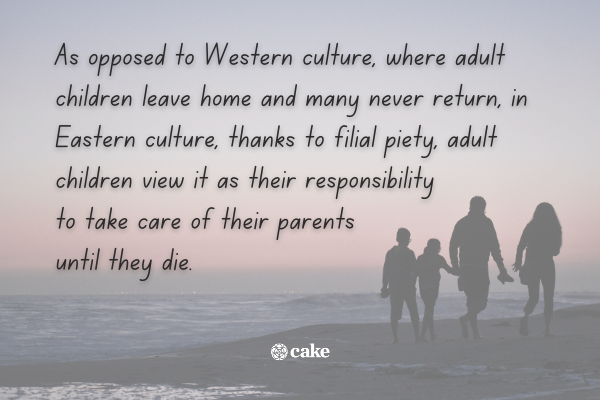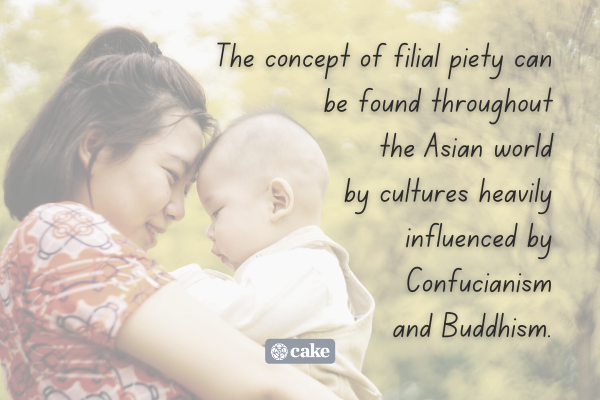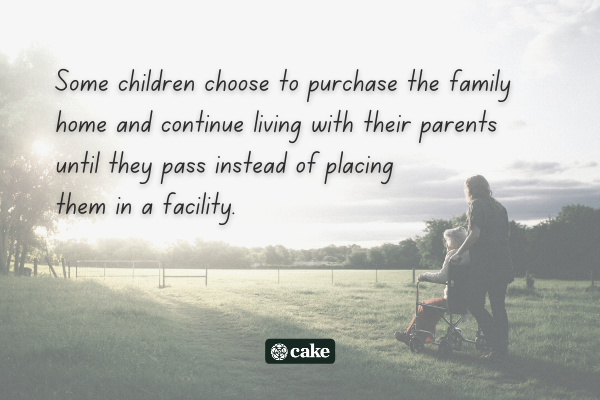What Does Filial Piety Mean
Did you know that filial piety guides unabridged countries in the way they treat older parents, grandparents, and older siblings? Showing respect toward parents is common, merely filial piety raises it to an fine art form.
Bound ahead to these sections:
- What Does Filial Piety Hateful?
- Where Does Filial Piety Come up From?
- Modern Examples of Filial Piety
Children raised with the concept of filial piety abound up understanding that their elders should receive fantabulous intendance equally they get older. For many, filial piety is not but a responsibility, just a solemn religious duty.
What Does Filial Piety Hateful?

Filial piety is the honor and respect children show their parents, grandparents, and elderly relatives. For example. when children demonstrate filial piety in China, they are viewed as trustworthy and respectable. Children who don't show respect to the elderly in their lives are viewed every bit shameful and of a bad character.
While respect shown to all older adults tin exist viewed as a form of filial piety, the deepest dedication is to be given to parents lonely. Filial piety is seen in many Eastern cultures through submission to the wishes of parents. They must assistance the elderly by making them happy and comfortable during the last years of their lives.
As opposed to Western culture, where adult children leave habitation and many never return, in Eastern culture, thanks to filial piety, adult children view it equally their responsibility to have care of their parents until they die.
Where Does Filial Piety Come From?

Filial piety is a Confucian philosophy. Parents raise their children, clothe them, feed them, breast-stroke them, and make sure that the first half of their lives are lived in peace, comfort, and harmony. Confucian philosophy says that for the second half of their lives, adult children volition take intendance of, feed, clothe, laurels, respect, and serve their parents.
The concept of filial piety can be institute throughout the Asian world by cultures heavily influenced by Confucianism and Buddhism. While it may non be called by the aforementioned name, the concept of filial piety can also be seen in the Middle East.
Confucianism
Co-ordinate to Confucian philosophy, filial piety is considered to exist the greatest of all virtues and should exist demonstrated to both the living and the expressionless. At its core, filial piety deals with the level of respect and obedience a kid must testify their parents. Since filial piety extends to both the dead and living, antecedent worship was formed from this Confucian instruction.
This concept of bestowing honor and respect became then ingrained into Chinese civilization that laws were built around filial customs. It besides led to unequal systems of relationships.
For case, in China'south early on days, if a child committed a crime against a parent, their sentence would be far heavier than if the same law-breaking was committed past the parent against the kid.
In Buddhism
In both Chinese and Indian Buddhism, filial piety played an of import function in both cultures. Karma, the idea that your deportment will come dorsum to you for skillful or for bad, was fundamental in creating a organization of filial piety. According to some scholars, filial piety was non just office of karma but was the best thing yous could do to produce skillful karma in your life.
In Buddhist teachings, the Buddha said that children were to honor parents as though they were honoring Brahma (God), support and respect their parents to pay dorsum the debt of childhood, and perform extra adept deeds for their parents to accumulate merit and beneficial karma.
Not ready to get-go your will?
It's a large step and we get information technology! Share your email and we'll remind you in a few days.
Thank you for subscribing. Wait an email before long!

Modern Examples of Filial Piety

While the concept of filial piety is connected to Chinese culture, it can be seen in many parts of the earth today from Due east to West.
Parents alive with adult children
In many parts of the world, one time parents end raising their children and developed children go married, roles start to reverse. As parents become older, parents will move in with one of their married children. In near Eastern cultures, parents motion in with a son. The son, girl-in-law, and grandchildren then support the parents. All their needs are met and they are provided with shelter, food, clothing, and condolement.
In the Due west, in America and Europe, a single child might choose to movement in with their older parents. The son or daughter volition intendance for them, cook, and supply their basic needs. In some cases, if the single caretaker kid gets married, they volition go along to live with the parents.
Some children choose to purchase the family home and continue living with their parents until they pass instead of placing them in a facility.
Children faithfully handle parents' finances
Regardless of whether parents are living with their children or not, there will come up a time when elderly parents need someone to handle their finances. If they are incapable of leaving their house and performing tasks such as cashing checks, visiting the bank, or paying bills, their children will take over for them. This is seen every bit a significant responsibility and a way to show accolade to parents.
Children are responsible for handling money as if they are an employee tasked with paying bills on time and making sure that the money stays safe. Co-ordinate to filial piety, taking money or payment for treatment parents' finances is seen as thievery and is deeply shameful.
» Become help from GoodTrust: Hands close downward and memorialize your digital accounts with GoodTrust'southward Executor+ plan. Only $90 per account. Learn more
Children support parents financially
With the connected increase of globalization, more children are moving farther from their parents for jobs, opportunities, and a shot at having a ameliorate life. When this is the case, children won't be living near or with their parents.
To make upward for the distance, some children cull to support their parents financially. If parents are non well off but they can alive at dwelling, they'll be supported with funds from their children. If they demand help while living at home, support may be offered to hire in-domicile help. Though non physically present, filial piety guides children in providing assistance for their parents then they tin live as comfortably as possible.
Children honor deceased parents
In Chinese culture, and many countries around the earth, filial piety tin can be seen in the way children laurels parents when they laissez passer abroad. Decease in unlike cultures will exist responded to uniquely, nonetheless, many similar concepts are shared.
While a dedicated mourning of period is not typical in most of America, many places and cultures around the earth reserve specific time gear up aside to properly mourn parents. If the mourning flow is broken, it appears shocking, scandalous, and sends a bulletin that the child does not respect the parent who has passed.
In some locations, children are expected to host elaborate funerals and hire professional mourners to demonstrate their filial piety. Without the outward brandish of loss, the community might view the children with shame because they did not demonstrate that they loved their parents.
Children honor deceased parents (remembrance)
In addition to honoring a deceased parent during the funeral, there are numerous opportunities for children to award their parents afterward. Placing incense, food, and other offerings for their parents on altars during different festivals is one mode filial piety is demonstrated.
In Korea, they honour their deceased relatives through the Jesa ceremony . They believe the spirits of departed relatives stay on world and care for their families for several generations. During the Jesa ceremony, Korean children volition laurels deceased ancestors by placing food and potable in a shrine and cleaning tombstones of dirt and grass.
In Chinese culture, they celebrate the Hungry Ghost Festival . During this fourth dimension, information technology is believed that the ghosts of departed relatives come up back and a child is expected to place food and drinks out for their parents or other elderly deceased relatives.
There are other traditions to be followed during the holiday, but each reflects respect for the dead through filial piety.
Respect, Accolade, and Virtue
Filial piety is seen in every part of Chinese culture and much of the Asian globe. It is demonstrated by showing respect toward parents, the elderly, and even the deceased. Regardless of how this concept is demonstrated, filial piety is a manner of honoring the life of ane's parents and honoring their legacy .
Sources
- Bedford, Olwen, and Yeh, Kuang-Hui. "The History and the Future of Psychology of Filial Piety: Chinese Norms to Contextualized Personality Construct." Frontiers in Psychology, Frontiers In, January 2019. frontiersin.org/articles/10.3389/fpsyg.2019.00100/full .
- Teon, Aris. "Filial Piety in Chinese Culture." The Greater China Journal. The Greater China Journal, October 2016. china-periodical.org/2016/03/fourteen/filial-piety-in-chinese-civilization/ .
- Editors. "Filial Piety." New World Encyclopedia, Creative Commons Attribution, 2020. newworldencyclopedia.org/entry/filial_piety .
- Chan, Wing-tsit. "Confucian Education." Asian Topics, Columbia University, 2020. afe.easia.columbia.edu/at/conf_teaching/ct02.html .
- Xing, Guang. "The Education and Practice of Filial Piety in Buddhism." Periodical of Constabulary and Organized religion, Cambridge University Printing, July 2016. www.cambridge.org/core/journals/periodical-of-police-and-organized religion/commodity/instruction-and-practice-of-filial-piety-in-buddhism/A15AB113AA373ABE0A33D559D0CB8534 .
What Does Filial Piety Mean,
Source: https://www.joincake.com/blog/filial-piety/
Posted by: simardritter54.blogspot.com


0 Response to "What Does Filial Piety Mean"
Post a Comment